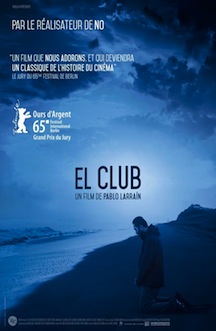Directed by Pablo Larrain
Country: Chile
The Chilean cult filmmaker, Pablo Larrain, endures in his keen observations of the society, interweaving themes such as obsession, morality, complex human conducts, and political denouncement, aspects that can be found in his singular cinematic creations such as “Tony Manero”, “Post Mortem”, and “No”.
In “The Club”, 2015 Berlin’s Grand Jury choice, he aims ferociously and bluntly at the Catholic Church, taking us to a secluded house located in a small Chilean seaside town, to where four former clergymen were sent after being accused of a variety of crimes, including pedophilia.
The house should work as a place of penitence and repent, but works more as a retreat center under the supervision of the permissive Sister Monica (Larrain’s wife, Antonia Zegers), who’s not so puritanical as she tries to surface. Among other things, she allows them to drink, watch TV, occasionally interact with other people, and even raising a greyhound, trained to be a racing champion by the obsessive Father Vidal (Alfredo Castro), a sly fox who often escapes the house and believes there’s nothing wrong with his impulses and behaviors.
The other excommunicates are: Father Silva (Jaime Vadell), who previously had served 35 years in the army; Father Ramirez (Alejandro Sieveking), whose mind seems a bit lost, but suddenly starts to describe past occurrences with an overwhelming accuracy; and the aggressive Father Ortega (Alejandro Goic) who curses and adopts a defiant posture whenever confronted with something that goes against him.
The days of false atonement are interrupted by two significant incidents.
Firstly, Father Lazcano (Jose Soza), under the influence of an overpowering depression, joins the flock after a long absence and listens to the recommendations of Sister Monica regarding the conduct to follow. His tearful eyes mirror infinite sadness, and we can tell right away he’s in a terrible affliction.
This coincides with the appearance of a drunken local man, Sandokan (Roberto Farías), who stops in front of the house and uninterruptedly shouts the sexual practices he was subjected by the newly arrived priest. Father Lazcano can’t resist the pressure and commits suicide by shooting himself in the head.
This radical act brings Father Garcia (Marcelo Alonso) into the house to start an investigation. He’s a former missionary and an experienced psychologist, highly prepared to deal with situations of crisis. By interrogating the priests, Father Garcia becomes more and more entangled in a spiral of deceit and cover-ups.
Tightly structured and compellingly acted, “The Club” is simultaneously repulsive, confrontational, mesmeric, and self-conscious, being conducted through characteristic elements of Larraín’s style: plenty of darkness all over, provocatively sneering undertones, and an inherent agony that often feels delirious.
The hazy cinematography of Sergio Armstrong, imbued of close-ups, helps to create such a cold atmosphere, letting us experiment the flagrant immorality and sickness of the soul that inhabit in the predators’ heart. These vigilant, startling states contrast with the peaceful surrounding landscapes. The musical score authored by Carlos Cabezas gives the proper weight and dimension to the circumstances
Unsurprisingly, and in opposition to the journalistic “Spotlight”, Mr. Larrain embraces an almost hostile, quite scornful approach to address the topic, totally given from an in-house perspective.


